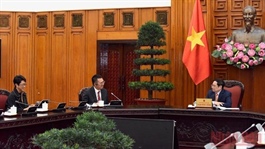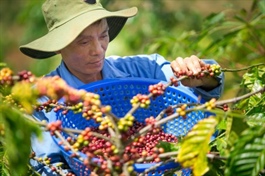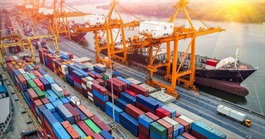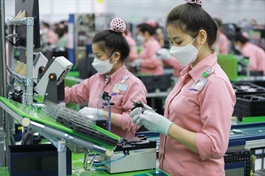Retailers shore up alliances in name of tackling non-plastic waste ambitions
Retailers shore up alliances in name of tackling non-plastic waste ambitions
Local supermarkets and consumer goods producers are working to turn towards eco-friendly alternatives and say no to plastic products to realise greener shopping targets and also contribute to the protection of the environment.

Nguyet, a housewife from Hanoi explained to VIR, “I have been using recycled packages and bags to do my groceries for two years. Using nylon and single-use plastic packages is convenient; however, I see these products’ serious impact on the environment through programmes on television and social networks, and cashier counters often encourage me and others to use eco-friendly alternatives. Thus, I decided to reduce the usage of single-use plastic bags as much as possible.”
Nguyet went on saying, “In my building, other housewives and young people also started to use eco-friendly bags after they saw the consequences of nylon and single-use ones on the environment on TV.”
The change in awareness of housewives like Nguyet is partially the result of retailers’ efforts in implementing communication strategies and action programmes to reduce the use of nylon and single-used plastic waste in the environment.
Non-plastic pioneers
Realising the important role of retailers in working with the government and people to reduce plastic waste, since 2019, retail group AEON Vietnam has launched the Disposable Plastic Waste Reduction project.
The project focuses on working with customers and the community to make environmentally conscious decisions by improving operations to minimise single-use plastics and managing plastic waste through waste segregation at the sources.
“Given the distinctive approach focusing on changing consumer awareness and behaviour, we identified that the causes for the environmental crisis partially come from inappropriate use and disposal of plastic. Therefore, even if we find a more sustainable and eco-friendlier alternative to plastic, similar threats to the environment can also occur if we keep the old consumption habits,” said AEON’s general manager of Strategic Human Resource Management, Corporate Communication, and External Affairs, Nguyen Thi Ngoc Hue.
The main mission of the project is to “work with customers and community to make environmentally conscious decisions”. Therefore, the project’s activities also mainly revolve around supporting consumers to make choices more convenient and easier.
Many initiatives have been implemented in the system of AEON Vietnam’s supermarkets and department stores. A total of 95 per cent of shopping bags at AEON shopping centres are currently compostable bags, expected to reach 100 per cent by the end of this year.
AEON Vietnam also opened priority cashier counters for customers who do not use biodegradable bags and give a small cash amount per bill to customers who use their bags when shopping. All employees can borrow eco-friendly bags when shopping, and the firm is preparing to expand this initiative to customers and its supply partners.
In addition to efforts to change consumer habits, an indispensable task in AEON Vietnam’s strategy to reduce single-use plastics comes from changing business procedures. For instance, packaging processes at the cashier are aimed at minimising the use of bags, from an average of five bags per transaction to only three bags. In addition, AEON Vietnam has been gradually replacing plastic cups and handles with paper cups and products with eco-friendly materials, such as disposable plastic bowls with bagasse bowls at the buffet food court on the ground floor.
Along with AEON Vietnam, other retailers are also implementing similar strategies to reduce single-use plastics. Previously, some supermarkets in Vietnam made news by opting to wrap food in eco-friendly materials like fresh banana leaves, beginning a new trend as people were becoming increasingly aware of the harmful effects of plastic bags.
Meanwhile, as a founding member of the Packaging Recycling Organization Vietnam (PRO Vietnam) and a member of the Anti-Plastic Waste Alliance, Nestlé has taken strong actions and inspired consumers in reducing plastic waste and raising the local community’s awareness in this regard.
Nestlé is the first company in Vietnam to use FSC-certified paper straws in instant drinks like Milo, Nesvita, and Nestlé milk. It is expected that by mid-2022, all of Nestlé’s instant drink products will switch to using eco-friendly straws. The initiative of the company aims to contribute to reducing nearly 700 tonnes of plastic waste in production each year.
Much-needed unity
Despite these campaigns to reduce plastic waste across the country with massive incentive programmes, these strategies are mostly aimed at short-term results and likely will not change the consumption habits of most people. To date, Big C Thang Long and Big C The Garden in Hanoi, as well as the freshly rebranded WinMart and WinMart+ stores, only have a few vegetables wrapped in paper and other eco-friendly packaging, while raw meat remains wrapped in plastics and single-use trays. In many supermarkets, there are no signs that eco-initiatives have penetrated the food court yet.
A survey conducted last March by the Institute of Strategy and Policy on Natural Resources and Environment (ISPONRE) under the Ministry of Natural Resources and Environment and its partners shows that Vietnam uses about 104,000 single-use plastic bags per day, or 38 million plastic bags a year. Each supermarket consumes about 1,454 plastic bags a day on average.
Do Quoc Huy, marketing director of Saigon Co.op told VIR, “It is not simply a question of whether we do business or not, it also directly affects businesses that provide goods to supermarkets and produce these items as well as consumers. Enterprises need enough time to find suitable alternatives.”
Besides this, some retailers feel alone on the journey to change the awareness of consumers, which requires consistency. Thus, they raised their voice to call the companionship of all retailers.
Amid the endeavour to curb the plastic threat and the importance of establishing an alliance to create a general foundation for retailers, ISPONRE, in collaboration with Hanoi Department of Industry and Trade, called on businesses to sign a commitment to join the Alliance of Retailers to Reduce Single-use Plastic Bags.
The alliance’s endeavour is one of four pilot projects within the framework of the project Rethinking Plastics – Circular Economy Solutions to Marine Litter, funded by the EU and the German government, and executed by German organisation GIZ and Expertise France in Vietnam.
As a result, 17 retailers and consumer goods producers joined the alliance with high determination and a specific action plan to solve the problem of plastic waste.
Nguyen Trung Thang, deputy director of ISPONRE commented, “The institute will continue to work with Hanoi Department of Industry and Trade and retailers to implement the alliance’s activities. At the same time, we will continue to coordinate with partners including PRO Vietnam, WWF Vietnam, the Dutch Embassy, the Sustainable Trade Initiative, the Asia Foundation and more – to reduce plastic waste and promote communication activities to change the environmental behaviour of the community.”
























